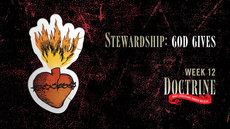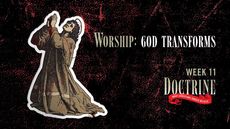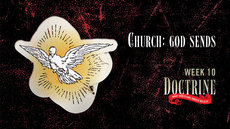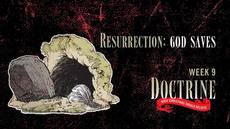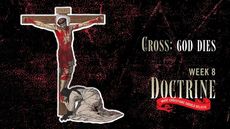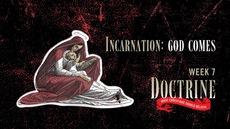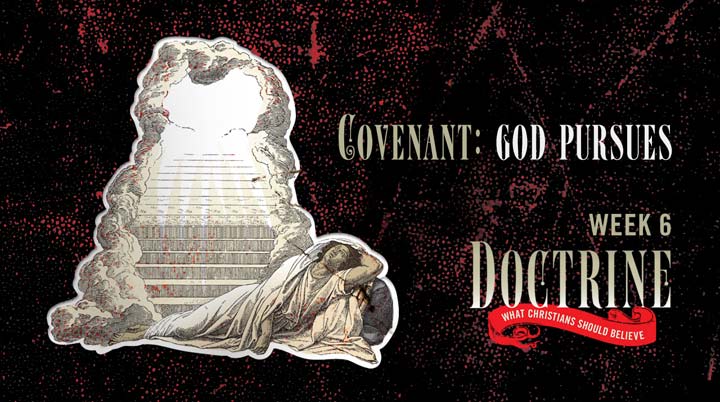
This week (Sunday, May 4) I preached the sermon Covenant: God Pursues as part of the Doctrine: What Christians Should Believe sermon series. This post is intended to help serve those in Mars Hill who are discussing the doctrine in their Community Groups, and also serve anyone else who desires to study the issue further.
What Is a Covenant?
Being God’s people is a repeated theme throughout both Testaments: "I will live among them and walk among them, and I will be their God and they will be my people" (e.g., Lev. 26:12; Jer. 32:38; Ezek. 37:27). The Christian story begins with creation in harmony, unity, and peace; it ends with a restored creation. Between these two bookends is the drama of redemption. The covenants are major dimensions (or acts) of this drama. The goal is to see the work and person of Christ in light of the Old Testament and to highlight aspects that we have possibly overlooked. Christ’s work is intimately related to and fulfills each of the five covenants (with Adam, Noah, Abraham, Moses, and David) that God initiated in the Old Testament. New dimensions are brought to light when Christ’s covenant is understood in the context of the previous covenants. Covenants are about God’s activity and intention to redeem us, and the covenants tell us about ourselves—our condition, our brokenness, our dignity, our role as images of God, our suffering, and our calling.
God entered into covenantal relationships with his people. There are explicit references of a divine covenant established with Noah (Gen. 6:18), Abraham (Gen. 15:18), Israel (Ex. 24:8), and David (Ps. 89:3). Israel’s prophets anticipated the coming of a "new covenant" (Jer. 31:31), and Christ himself spoke of the last supper in covenantal language (Luke 22:20).
The word for covenant is berith in Hebrew and diatheke in Greek. A covenant is "a bond in blood that is sovereignly administered" (O. Palmer Robertson, The Christ of the Covenants, p. 4). When God enters into a covenantal relationship with humanity, God sovereignly institutes a life-and-death bond. Thus, a covenant is a life and death relationship with God on his terms.
- A bond—This implies relationship. It commits people to one another, God to God’s people, and people to God. Oaths, promises, and signs accompany the bond or commitment.
- A bond in blood—There is an ultimacy or intensity in the covenant. By initiating covenants, God never enters into the relationship casually or informally. Covenant relationship signifies the life-and-death intensity of the bond. This intensity is seen in all three types of covenants—human to human (Gen. 21:27, 32; 2 Sam. 3:12, 13), God to human (Abraham—Gen. 15:18; Moses—Ex. 24:8; Deut 5:2; David—2 Chron. 21:7; Ps 89:3; the New Covenant—Jer. 31:31; Ezek. 37:26), human to God (2 Kings 11:17; 2 Kings 23:3; 2 Chron. 29:10). The establishment of a covenant is called "cutting a covenant." It usually entails the slaughter of an animal. This symbolizes or represents the curse that the covenant-maker calls down upon himself or herself if they should violate the commitment that was made.
- A bond in blood sovereignly administered—There is a unilateral form of covenantal establishment. There is no bargaining, bartering, or contract negotiations. The sovereign lord of heaven and earth dictates the terms of God’s covenants. It is God’s covenant in that it is conceived, devised, determined, established, confirmed, and dispensed by God himself: "Behold, I am establishing my covenant with you."
God makes six major covenants in the Bible:
- Adam and Eve (Gen. 1:26–2:3)
- Noah and his family (Gen. 9:8–17)
- Abraham and his descendants (Gen. 12:1–3; 17:1–14; 22:16–18)
- Moses and the Israelites (Ex. 19:5–6; 3:4–10; 6:7)
- David and the Kingdom of Israel (2 Sam. 7:8–19)
- Jesus and the Church (Matt. 26:28; 16:17–19)
The purpose of these covenants was to address the problem of the human race. The claim that God has, in principle, solved that problem with the establishment of his covenants is echoed across the Old Testament. The covenants are the story of God's uncaused, gracious, and generous love. God is under no obligation to rescue humans and the world from their plight, but chooses to do so and takes the initiative to bring it about.
As the story develops throughout the Old Testament, this covenant love is referred to in various terms, but the main one is hesed. According to Vine's Expository Dictionary, "The entire history of God's covenantal relationship with Israel can be summarized in terms of hesed."
Hesed is God’s loving kindness—the consistent, ever-faithful, relentless, constantly pursuing, lavish, extravagant, unrestrained, one-way love of God. It is often translated as covenant love, loving kindness, mercy, steadfast love, loyal love, devotion, commitment, or reliability. Hesed turns up regularly in the Old Testament, particularly in the Psalms. It is typically translated "love" and sometimes translated as "mercy" (Ps. 23:6). However, hesed has a much narrower definition than the English term "love" conveys. In the Hebrew Scriptures, hesed refers to a sort of love that has been promised and is owed—that is, covenant love—as in Hosea 11:1: "When Israel was a child, I loved him, and out of Egypt I called my son." Covenant love is the love God promised to give to his covenant people, and which they in turn were to respond to in kind, loving God with all their hearts, minds, and strength. Hesed does not suggest some kind of generic love of everyone.
Malachi 1:1–5 is a clear presentation of hesed. Malachi opens with the declaration of the word of Yahweh: "I have loved you." This affirmation of God’s choice of and affection for the nation provides a powerful beginning to the message to be given. On the one hand, it will soften the tone of the messages—they will be delivered in love. On the other hand, it will underscore the nation’s ingratitude.
The people were not immediately convinced of this declaration; to them, because of their state of spiritual rebellion, it sounded good but was not convincing because things had not worked out to their satisfaction. "How have you loved us?" they asked. And the prophet’s response reminded them of their status as the chosen people of God: "Is not Esau Jacob’s brother? . . . Yet I have loved Jacob, but Esau I have hated." The point that Malachi was making to his audience was that their existence as the people of God was the clearest evidence of the love of God. God chose the Israelites to be his kingdom of priests in the world. He gave them the Scriptures, the temple, the priests, the prophets, the covenants, and the Messiah. And his love for them was an everlasting love—even though they failed him again and again, he still retained his covenant with them.
Not only did God choose Israel ("Jacob"), but he also cared for the Israelites whenever they were in trouble. The simple fact was that Israel was protected throughout the ages. This should have told Malachi’s audience that the love of God was genuine. Not only had God protected Israel from the treatment they received from Edom, he also restored Israel to her land and left the mountains of Edom a wasteland. This was a clear demonstration of God’s love for his people.
For each of these covenants, it is helpful to highlight five special features (see Scott Hahn, A Father Who Keeps His Promises: God’s Covenant Love in Scripture):
- The covenant mediator (the person God makes the covenant with) and his covenant role (whom the mediator represents).
- The blessings promised in the covenant.
- The conditions (or curses) of the covenant.
- The "sign" by which the covenant will be celebrated and remembered.
- The "form" that God's family takes as a result of the covenant.
What Is the Adamic Covenant?
The covenant with Adam (Gen. 1:26–2:3; Hos. 6:7). The word "covenant" isn't used, but the story of Adam and Eve is told in covenantal language. Adam is the covenant mediator in his role as husband. God promises blessings—that their union will be fruitful and their offspring will fill the earth and rule over it. God establishes a sign by which the covenant will be remembered and celebrated—the Sabbath, the seventh day of rest. And God imposes one condition that they must keep to fulfill their obligation under the covenant—that they not eat from the tree of the knowledge of good and evil. God attaches a curse for disobedience—that they will surely die. By this covenant, God's family assumes the form of the marriage bond between husband and wife.
What Is the Noahic Covenant?
The covenant with Noah (Gen. 9:8–17). The word "covenant" is used in the case of Noah, as God promises never again to destroy the world by flood. The covenant is made with all humanity, through the mediator, Noah, in his role as the father of his family. The covenant includes blessings to Noah and his family (that they will be fruitful and fill the earth) and conditions that must be obeyed (not to drink the blood of any animals, not to shed human blood). The sign of the covenant is the rainbow in the sky. By this covenant, God's people assume the form of a domestic household, an extended family.
What Is the Abrahamic Covenant?
The covenant with Abraham (Gen. 12:1–3; 17:1–14; 22:16–18). God swears to give Abraham a great land and to bless his descendants, who will become a great nation. God makes the covenant with the mediator Abraham in his representative role as chieftain. God promises the blessings of land and great nationhood for his descendants, and through them to bless all the nations of the earth. The sign of the covenant is the mark of circumcision. Circumcision is also the condition that Abraham and his descendants must obey in order to keep the covenant. By this covenant, God's family takes a "tribal" form.
What Is the Mosaic Covenant?
The covenant with Moses (Ex. 3:4–10; 6:7; 19:5–6). By this covenant, made with the mediator Moses in his representative role as the judge and liberator of Israel, God swears to be Israel’s God and Israel swears to worship no other but the Lord God alone. The blessings promised are that they will be God’s precious and chosen people. The conditions of the covenant are that they must keep God's Law and commandments. The covenant sign is the Passover, which each year commemorates Israel’s birth as a nation. By this covenant, God’s family assumes the form of a "holy nation, a kingdom of priests."
What Is the Davidic Covenant?
The covenant with David (2 Sam. 7:8–19). God promises to establish the mediator David’s "house" or kingdom forever, through David's heir, who will also build a temple to God's name. To David in his role as king, God promises to make David's son his son and to punish him if he does wrong but never take away his royal throne: "Your house and your kingdom shall be made sure forever." Through the blessings of this kingdom God promises to give wisdom to all the nations. The sign of the covenant will be the throne and temple to be built by David's son, Solomon. By this covenant, God's family grows to take the form of a royal empire, a national kingdom.
What Is the New Covenant?
The New Covenant of Jesus (Matt. 16:17–19; 26:28). The sixth and final covenant is made by the mediator Jesus, who by his cross and resurrection assumes the role of royal high priest and fulfills all the promises God made in the previous covenants. The prophets, especially Isaiah and Jeremiah, had taught Israel to hope for a Messiah who would bring "a new covenant," through which God's law would be written on men's and women's hearts (see Jer. 31:31–34; Heb. 8:8–12). The conditions of the covenant are that men and women believe in Jesus, be baptized, eat and drink his flesh and blood in remembrance at communion, and live by all that he taught. The Lord’s Supper is the sign of the New Covenant. By this covenant, God establishes his family in its final form as a universal (katholicos or "catholic" in Greek) worldwide kingdom, which Jesus calls his Church.
For Further Study
- Clark, R. Scott. "A Brief History of Covenant Theology." 2001. //www.wscal.edu/clark/briefhistorycovtheol.php .
- Hahn, Scott. A Father Who Keeps His Promises: God’s Covenant Love in Scripture. Ann Arbor, MI: Servant Publications, 1998.
- Robertson, O. Palmer. The Christ of the Covenants. Phillipsburg, NJ: P & R Publishing, 1981.
